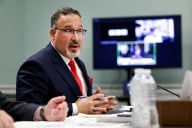You have /5 articles left.
Sign up for a free account or log in.
WASHINGTON -- When Education Secretary Betsy DeVos makes an appearance before lawmakers on Capitol Hill, one would expect a hostile reception from Democrats who have opposed her since she was nominated for the job. Less expected is open skepticism from Republicans.
That's exactly what DeVos got Tuesday, however, at a Senate appropriations subcommittee hearing on the proposed White House budget for 2018, which includes deep cuts to education programs as well as other nondefense spending.
"This is a difficult budget request to defend," said Missouri Republican Roy Blunt, the subcommittee's chairman, in opening the hearing.
Blunt said it was unlikely the kinds of cuts proposed in the budget would be passed by Congress. Those cuts included reductions to college-readiness programs like TRIO and GEAR UP as well as to campus-based aid like Federal Work-Study. Taken together, those proposals would make it more difficult for students to get into college and graduate to get well-paying jobs, Blunt said.
The critical reception of the budget from Blunt and several fellow Republicans underlined how extreme many of the proposed spending cuts would be. Blunt noted that lawmakers in April were able to reach a deal on an omnibus 2017 spending bill that accomplished priorities like restoring year-round Pell Grants and slightly increased funding for several aid programs. The White House budget would take the department in the opposite direction, even for some stated priorities of the administration.
Senator Richard Shelby, an Alabama Republican, said proposed cuts to career and technical education -- which the Trump administration has praised as an alternative to traditional four-year college -- were "troubling." The White House budget cuts CTE grants to states by $168 million -- about 15 percent.
DeVos also underwent repeated grilling from Democrats who took issue with the budget cuts she was tasked with defending, as well as recent staff hires and her approach to student loan policy. Senator Dick Durbin, an Illinois Democrat, said the White House budget proposal would worsen the student loan crisis in the country and said the Department of Education under DeVos did not appear willing to police the for-profit colleges that are responsible for a disproportionate number of student loan defaults.
The secretary said climbing student loan debt volumes are a real concern but the government must address a much broader issue in higher education.
"We haven't done a good job of helping students know what their full menu of options are when pursuing higher education," DeVos said. "We've segmented our career and technical education so that it seems like the lesser of two choices."
Year-Round Pell
The Trump administration has endorsed restoration of year-round Pell Grants, a policy change already enacted by Congress that allows eligible college students to use Pell benefits for summer semesters. But work remains for the department to spell out how the implementation of the program will proceed. The guidance it issues will clarify to colleges and universities when those benefits can be paid out and which students would qualify.
DeVos told senators Tuesday that the department is on track to issue guidance for the program by July 1. But there appeared to be some confusion after the hearing about whether additional aid would actually be available to students this summer. A department spokeswoman said it was unclear "pending further guidance from the department" whether that aid would be released to students this summer.
Title IX Religious Exemptions
In an exchange with Senator James Lankford, an Oklahoma Republican, DeVos also indicated she was open to ending the publication of a list of institutions that seek exemptions from Title IX's requirements for religious reasons. In response to pressure from advocates for gay and transgender students, the department began releasing a list of those colleges and universities in the final year of the Obama administration. A 2015 report from the Human Rights Campaign said the department doesn't have much discretion in the granting of those exemptions but argued that public knowledge of the requests is important to protect LGBT students. Without transparency, those students could find themselves enrolled at institutions legally granted the ability to discriminate against them, the group argued.
Lankford told DeVos federal law allows institutions to seek those exemptions and that proactively releasing a list -- as opposed to a response to a Freedom of Information Act request -- is a form of shaming religious entities.
DeVos said it sounded like a public list is not necessary.
"Religious liberty is a very key and important issue to be discussed in the context of all educational settings," she told Lankford.
Asked whether DeVos's comments signaled a change in the policies of the department, a spokeswoman said no decision has been made regarding the religious exemptions list.








